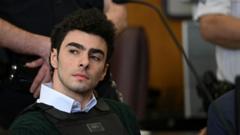Luigi Mangione has pleaded not guilty to federal charges regarding the murder of UnitedHealthcare CEO Brian Thompson, who was shot and killed outside a Manhattan hotel last year. The 26-year-old’s not guilty plea, entered during a court appearance in Lower Manhattan, sets the stage for an upcoming trial where federal prosecutors are seeking the death penalty if he is convicted.
Under arrest since December, Mangione faces serious allegations of murder and stalking related to Thompson's death, which authorities have described as an "act of political violence." Mangione entered a crowded courtroom in a prison outfit and handcuffs, clearly aware of the indictments read to him, responding with a firm "not guilty" when prompted by the judge.
On the same day, federal prosecutors formally announced their intention to pursue capital punishment, claiming Mangione's motive was to send an ideological message against the health insurance industry. This has prompted his defense team to label the potential execution as "barbaric."
The arraignment included Judge Margaret Garnett discussing the timeline leading up to the trial, with the defense team acknowledging the need for several months to sift through "three terabytes" of evidence, which encompasses various forms of data, from police footage to social media interactions. This extensive review pushes Mangione's trial back, now set to take place no earlier than 2026, with a follow-up hearing scheduled for December 5.
Karen Friedman Agnifilo, Mangione's attorney, argued for a federal trial to occur before any state proceedings, highlighting concerns surrounding constitutional implications. She raised alarms over state prosecutors allegedly eavesdropping on Mangione's communications with her while he awaits trial.
Additionally, Judge Garnett highlighted the importance of adhering to public statement regulations, ensuring a fair trial process and jury selection, as tensions around the case rise. The murder of Thompson, who fell victim to gunfire on December 4, has sparked debates on healthcare privatization, with some expressing support for Mangione, raising funds for his defense that now total nearly $1 million.
As Mangione's case unfolds, the implications of his actions and the public's response paint a complex picture of dissent against an industry seen by many as contributing to healthcare inequality.



















